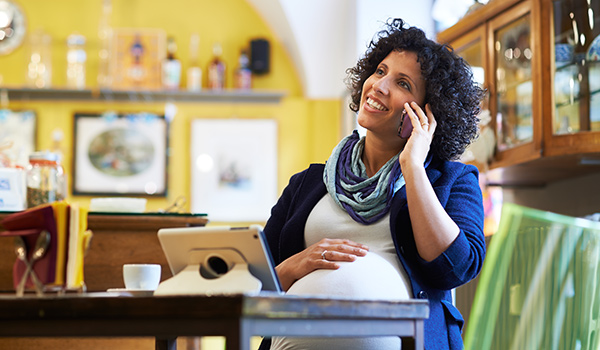
When it comes to pregnancy, everyone is different. However, there are a handful of useful wellness tips that every pregnant woman could use. In this post, we’ll go over 10 useful wellness tips for pregnant women. NOTE: Make sure to check with your care provider before you use any of these wellness tips. Pregnancy is different for every woman and you might have special considerations.
Increase your iron intake
An important component of blood is a protein known as hemoglobin. The more iron you consume, the more hemoglobin your body will create and vice versa. Pregnant women who fail to take iron during pregnancy are putting themselves at risk for anemia (low blood levels) and even death during childbirth. If you have slacked on your iron intake so far and you are pregnant, now is the time to start building up your iron/hemoglobin supply. You get iron as a supplement at your local pharmacy. You can also get iron through foods like spinach, tofu, dark chocolate, lentils, beans, eggs, fish and cashews.
Increase your water intake
Drinking water is important during pregnancy because it could prevent your baby from having jaundice when he or she is born. When a newborn has jaundice, their eyes and skin are yellow from a pigment called bilirubin. Bilirubin is produced when red cells are broken down. Regularly, the liver would then get rid of bilirubin. However, in some infants who don’t yet have a fully mature liver, bilirubin could build up and lead to jaundice. You can help prevent jaundice in your baby by drinking a lot of water which will help your baby flush these toxins out of their body. Jaundice is 100% treatable.
Start taking folic acid
A deficiency in folic acid for mom is linked with spina bifida in newborns. In spina bifida, a baby’s spinal cord does not fully develop. This can lead to lifelong disability. You can buy folic acid as a supplement at your local pharmacy. You can also find it in foods like broccoli, spinach and lentils.
Nutrition recommendations during pregnancy
As you can tell from the points above, what you consume during your pregnancy affects your baby directly. Thus making healthy food choices is not just a smart move; your baby’s survival depends on it. You can never go wrong with a balanced diet that contains vegetables, fruits, proteins and healthy sources of calcium, iron, iodine and folic acid. Being pregnant does not require you to eat twice as much food. In fact, starting with the second trimester, most pregnant women only need between 300 and 450 calories more.
Stay away from certain foods
Unfortunately, being pregnant means staying away from certain foods and drink. Alcohol and caffeine are not advisable for you to drink when you’re pregnant. Raw or rare foods like oysters, shrimp and sushi may contain bacteria that can harm your baby. You should avoid rare and under-cooked meats as well. Unpasteurized milk, juices and cheese are also a no-go.
Staying active during pregnancy
If you were not exercising before, pregnancy is not the time to start training for a marathon. Aim to exercise for at least 30 minutes a day five times a week. This could be as simple as taking a walk around the neighborhood, low impact dance classes, swimming or doing house chores. It’s important to stay away from activities that increase your risk of falling.
Gestational diabetes screening
Gestational diabetes is a type of diabetes that some women develop during pregnancy. Getting screened for it is important because it can lead to problems like:
- Your baby growing bigger than usual. This may result in a need for a C-section.
- Your baby may be at risk for childhood obesity.
- You will be at risk for Type 2 diabetes after the baby is born. Thus it will be important to get screened for type 2 diabetes if you are diagnosed with gestational diabetes.
If you have gestational diabetes, you and your doctor/midwife can work together on a plan to help both you and your baby. Diet and exercise are usually the most helpful methods to reduce the risk.
Preeclampsia screening
Eclampsia is a life-threatening complication of pregnancy that regularly leads to the death of the pregnant woman and/or the baby. Preeclampsia is a condition that tells doctors that the risk of eclampsia is high. Preeclampsia is diagnosed when a pregnant woman has consistently high blood pressure. This high blood pressure can lead to seizures. If you are far along enough (at least 24-28) weeks when preeclampsia is detected, the doctors may have to deliver your baby preterm. This is because the only effective treatment for preeclampsia is to deliver the baby. Talk to your doctor about preeclampsia so you are screened for it early.
Manage your stress levels
It is important to manage your stress levels during pregnancy. If you are prone to anxiety or PTSD, talk to your doctor about how this might affect your pregnancy.
Talk to your doctor or midwife about birth methods
The culmination of the pregnancy experience is labor and finally giving birth. A lot of women and their families find it helpful to talk to their doctor or midwife about birth methods and what they can expect during pregnancy. You might want to skip the epidural or perhaps have a water birth at home.
Wellness Tips For Pregnant Women
It is helpful to gather all the information you need from your care provider before the day actually comes.
Did you find this post on wellness tips for pregnant women helpful? Share it with someone else that needs it.

